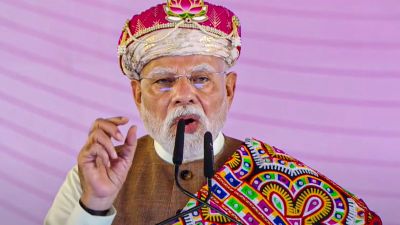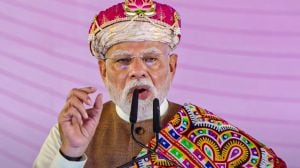Comrade Theory
FACES speak volumes. These days every line on West Bengal Chief Minister Buddhadeb Bhattacharya’s face conveys a rare sincerity. Senior...

FACES speak volumes. These days every line on West Bengal Chief Minister Buddhadeb Bhattacharya’s face conveys a rare sincerity. Senior politburo member Sitaram Yechury has always carried a friendly smile that breeds instant camaraderie. Prakash Karat’s face has an undefinable something else, an aloofness mixed with charm. His friends say it is not yet charisma but is on its way to being.
This past week belonged to Karat. Whether he makes it to the CPI(M) general secretary’s post this evening — and replaces the ageing, ailing Harkishen Singh Surjeet — doesn’t matter. It was beyond doubt at the 18th congress of the CPI(M) in Delhi that the party was with Karat.
And Karat was carrying the party. As the biggest ever CPI(M) Lok Sabha contingent pledged to expand beyond its bastions of West Bengal and Kerala, it was Karat by Surjeet’s side, reading out his speech, aiming a jibe or two at the BJP.
IDEOLOGICAL commitment may have prompted Karat to grow into the CPI(M) via Delhi’s Jawaharlal Nehru University, but he looks every bit the party’s first 21st century career politician. And this is where Karat’s faultline lies. He had wanted to mould himself into a ‘‘professional revolutionary’’, a job description that Vladimir Illych Lenin prescribed almost a century ago. Today, Karat’s critics say he is more ‘‘professional’’ than ‘‘revolutionary’’.
Karat’s professional graph has seen too steady a rise, too without hiccups, as though he is one Marxist who’s known his destiny all along. It is this singular stolidity that promotes comments that Karat has not seen it or experienced it all, not yet at any rate. The real battle happens on the ground in West Bengal and Kerala. Karat has led a shielded life in central Delhi’s A.K. Gopalan Bhavan, an ivory tower environment where every crisis has brought in politburo veterans for support and wisdom.
Not that Karat has not weathered any adversity. He has been in the thick of crucial debates, taking a strong position, in 1996, on whether the party should allow Jyoti Basu to be prime minister. Or whether the CPI(M) should join the UPA government in 2004.
Karat’s counsel has often been preferred because his ideological moorings are unquestionable — he was trained by the austere former general secretary, P. Sundaraiya — and because he is neither too adventurous nor too conservative. Like his guru, Karat believes in consolidation first, new acquisition later.
Some would say this is a Sundaraiya-brand of Marxist stubbornness. It doesn’t always pay. After all, the party didn’t grow in Uttar Pradesh and Delhi when Karat was put in charge.
BORN in 1948 in Myanmar — his Malayali father was a railway official there — Karat graduated from Madras Christian College. He did his MSc in political science from Scotland’s Edinburgh University. At JNU, he was the students’ union president, and led the SFI between 1974-79.
An avid reader of crime thrillers, Karat was made a member of the central committee in 1985, along with Yechury. And Yechury’s name will always be pronounced in the same breath as his because they were made politburo members in the same year: 1992.
Even if he becomes general secretary, Karat will have to persist with this ‘‘dual’’ leadership. After all, long years ago, the party decided he was the organisation man and Yechury the external ambassador.
This is a strange juncture in the party’s life. It is trying to redefine itself at a time when communism feels it can ride the anti-Bush sentiment to a new destination. Prakash Karat’s is not an easy job. He has to wave the red flag, when the world’s interest in red has flagged.
Photos


- 01
- 02
- 03
- 04
- 05





























